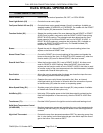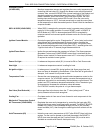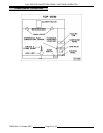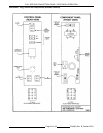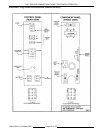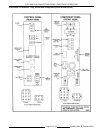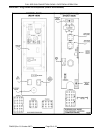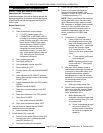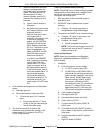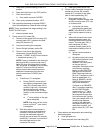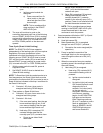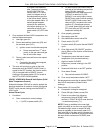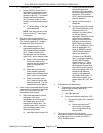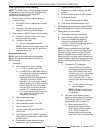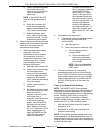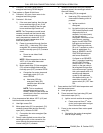
FULL SIZE GAS CONVECTION OVENS - ELECTRICAL OPERATION
F24682 (Rev. B, October 2007) Page 38 of 68
b. When the convection fan motor
reaches operating speed, the
centrifugal switch on the motor
closes. The heat relay (R3) is
then energized, R3 relay
contacts normally open (N.O.)
close and the heating circuit is
powered.
a) Ignition control module is
energized.
b) No ignition light (red) comes
ON, module performs a self
diagnostic test for 4
seconds, 2nd valve (main)
on the gas valve is
energized. Gas starts to flow
to the burner, sparking
begins, the NO IGNITION
light goes out and burner
lights. Sparking continues
for up to 7 seconds or until a
flame is established. If a
flame is SENSED, the NO
IGNITION light stays out
and burner remains lit.
If a flame is not SENSED
after 7 seconds of sparking,
the NO IGNITION light
comes back on, 2
nd
valve
(main) on the gas valve is
de-energized and gas flow
to the burner stops. Ignition
trial cycle repeats after a 15
second purge between
cycles for two additional
tries before locking out. To
reset after a lockout, turn
power switch (S1) OFF then
ON.
4. Oven reaches set temperature and thermostat
opens.
A. Heat light goes out.
B. Power removed from heat relay (R3).
1) R3 normally open (N.O.) contacts
open.
a. Power removed from 2
nd
valve
(main) on the gas valve and gas
flow to the burner stops.
5. The oven will continue to cycle on the
thermostat until the doors are opened or the
power switch (S1) is turned to the OFF or
COOL DOWN position.
Timer Cycle (Normal Roast Cooking)
NOTE: The ROAST timer (normal cooking) operates
independently of the heating cycle. Additional time
can be set or the timer can be turned OFF
throughout the cooking cycle.
1. With the power switch turned ON, power is
supplied to timer.
2. Set ROAST timer to desired time (normal
cooking).
A. Contacts 1 & 3 close, timer motor is
energized and timing DOWN begins.
3. Time expires on ROAST timer (normal cooking).
A. Contacts 1 & 3 open, timer motor is de-
energized and timing stops.
B. Contacts 1 & 4 close.
1) Buzzer energized and sounds.
NOTE: The buzzer continues to sound until
the timer dial is set to the OFF position or
additional time is set.
Roast and Hold Cycle
NOTE: Refer to the Installation and Operation
Manual for a detailed explanation of ROAST &
HOLD cooking.
1. Conditions.
A. Oven connected to correct voltage.
1) L1 (HOT) to power switch (S1).
2) L2 (NEUTRAL or SECOND LINE) to
one side of the following components:
power ON light, heat light, oven cavity
lights, buzzer, ROAST timer motor
(normal cooking), ROAST & HOLD
timer motor, heat relay coil (R3),
convection fan motor (C), transformer
primary (T1), relay coil (R4), motor
speed relay coil (R1), hold relay coil
(R2) and the component cooling fan.
B. Oven properly grounded.
C. Gas supply valve ON.
D. Gas combination control valve ON.
E. Power switch (S1) OFF.
F. Function switch (S3) set to ROAST &
HOLD cycle.
G. Oven light switch (S2) ON/OFF (position
has no affect on the function of the Roast &
Hold cycle).
H. Control thermostat in the OFF position
(OPEN).
I. High limit switch CLOSED.



